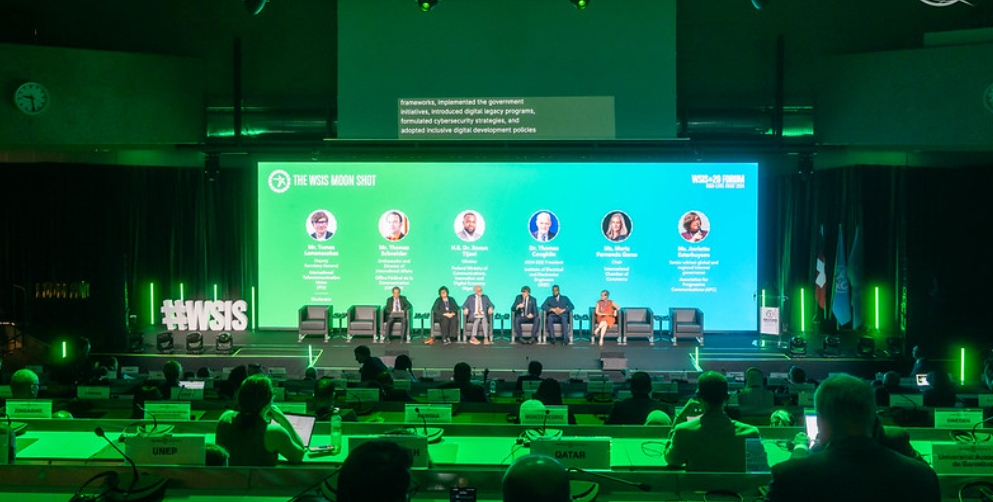IFLA at the WSIS+20 Forum: Libraries for a more people-centered Internet
03 يوليو 2024
Last week the WSIS+20 Forum High-Level Event took place in Geneva from the 27 to the 31 of May. This event marked a significant milestone of twenty years of progress made in the implementation of the outcomes of the World Summit on the Information Society, which took place in two phases — Geneva in 2003 and Tunis in 2005. Twenty years ago WSIS was the space that set an initial framework for global digital cooperation with a vision to build people-centric, inclusive, and development-oriented information and knowledge societies.
Just as in the the past, IFLA attended this event to continue its ongoing commitment to this process since its foundation at the 2003 Geneva Summit, and engaged in diverse multistakeholder discussions to highlight the crucial role that libraries play as key actors of the information society.

Earlier this year, IFLA submitted its annual contribution and +20 year review to each of the WSIS action lines, which became part of the stock of achievements, key trends and challenges compiled by CSTD and ITU since the 2003 Geneva Plan of Action. This event was an occasion for the international community to assess opportunities for global digital cooperation and to join forces towards a reinvigorated shared vision of the original WSIS action lines that will inform the upcoming UN Summit of the Future in September this year.
As part of its participation in this event, IFLA hosted a session in collaboration with the UNESCO-Information For All Programme (IFAP), bringing together a series of speakers that highlighted the importance of closing the digital divide and catering to the underserved as the only pathway towards the achievement of a truly people-centered information society. The panelists included:
- Xianhong Hu, Programme Specialist, UNESCO-IFAP
- Melle Tiel Groenestage, Senior Director of Digital Inclusion, Global Mobile Systems Communications Association (GSMA)
- Maja Maricevic, Director of Science and Innovation, British Library
- Ignace Haaz, Managing Editor, Globethics
A discussion was held showcasing examples of best practices for the empowerment of communities through inclusive access, where Xianhong Hu, emphasized the importance of using tools such as the UNESCO Guidelines for the Governance of Digital Platforms and GSMA shared some of the main challenges perceived by the mobile industry. Affordability of devices and development of digital skills remain at the top of the list of priorities to tackle the divide. The central role and changing paradigm of libraries was also discussed by the British Library that presented pre and post AI inclusive interventions led by libraries, raised the importance of promoting human-centric design of systems and services and mentioned the relevance of increasing understanding of digital rights, including digital cultural rights.
A call to action was also made via the session as an invitation for stakeholders to collaborate in coordinated efforts to address the divide by leveraging the skills of diverse actors and sectors.
IFLA also participated in a UNESCO led session on ‘Guaranteeing an Online Space for All’ to discuss the outcomes of the C3 action line on access to information, to emphasize the renewed role of libraries throughout the digital transformation and to discuss the importance of its upcoming Internet manifesto in the WSIS context.
Overall via the forum, many actors shared their vision on how they see the WSIS process evolving beyond 2025. For libraries, some of the highlights in this regard included the continuous need to consider access to information as a human right and not a privilege and the will to engage the cultural and creative industries in the digital transformation, particularly in the face of AI and emerging technologies as this new digital ecosystem poses significant challenges for fair remuneration and working professionals in the cultural sector. Many stakeholders also called for wider linguistic diversity in terms of AI content, and the inclusion of indigenous languages and minority contents via large processes.
Other initiatives launched via the forum include the following:
– ILO Policy Observatory on work in the digital economy
– UN Digital Community
–UNECE digital product passports for sustainability